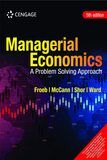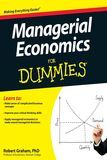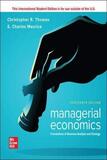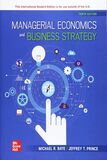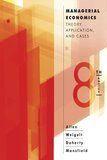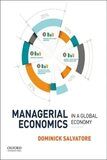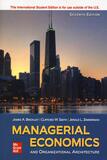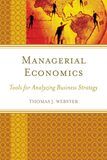Top 10 Best Managerial Economics Books [2025]
Managerial economics is a stream of business and management studies and a branch of economics that focuses on solving business problems and decision-making skills by applying theories and principles of both microeconomics and macroeconomics. Studying managerial economics books can help students and professionals elevate their thought and decision-making processes.
Here is a list of the top 10 best and most influential managerial economics books -
- Managerial Economics: A Problem Solving Approach ( Get this book )
- Managerial Economics For Dummies ( Get this book )
- Managerial Economics ( Get this book )
- Managerial Economics And Business Strategy ( Get this book )
- Managerial Economics: Theory, Applications, And Cases ( Get this book )
- Managerial Economics: Applications, Strategies, And Tactics ( Get this book )
- Managerial Economics In A Global Economy ( Get this book )
- Managerial Economics & Organizational Architecture ( Get this book )
- Managerial Economics: Tools For Analyzing Business Strategy ( Get this book )
- Forestry Economics: A Managerial Approach ( Get this book )
Let us go through each of the books to understand their scope, importance, and learnings –
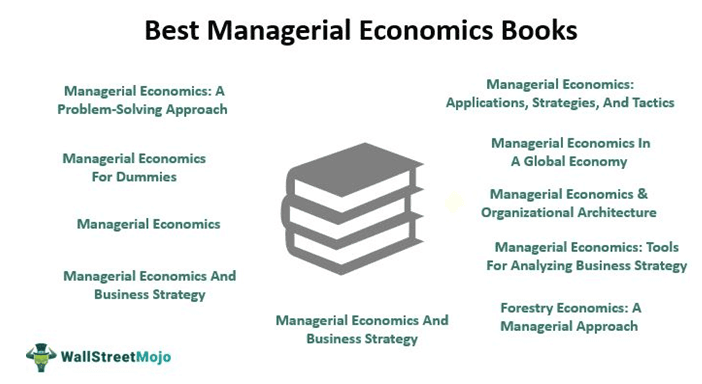
#1 - Managerial Economics
A Problem Solving Approach
By Luke M. Froeb, Brian T. McCann, Michael R. Ward, and Mikhael Shor
The book was first published in 2007, and later new editions and revised chapters were added to it. It is the work of four individuals coming together.
Book Review
Managerial economics has been an integral part of business, and this book can help people who want to develop a problem-solving approach in their personality. Every day business owners and management come across a different set of problems, all needing a slightly different process, more importantly, a problem-solving approach. It is where this book comes into the picture. It talks about the other tactics to be proposed to solve issues and raise standards.
Key Takeaways
- The book has ongoing references for business students.
- It shares a wider perspective toward profitable decisions and implementations within an organization.
- The book comprises business models and traditional material to help students.
- A student adopting the techniques from this book can become a quick decision-maker.
#2 - Managerial Economics For Dummies
By Robert Graham
First published in 2013, the book is known for its convenience regarding the subject understanding of managerial economics.
Book Review
Robert Graham has written the book to make the concepts of managerial economics easy and convenient for new students. Most of the time, students do not fully understand a term and its importance and later feel bad about it. To stop this, the author has come up with this book to ensure that every student has an equal chance and the terms are explained so that it gets fully processed by everyone.
Key Takeaways
- The book throws light on major concepts like demand elasticity, quantitative analysis, risk analysis.
- It contains numerous easy-to-understand examples.
- The book is written for every student and does not require an advanced mind to comprehend.
#3 - Managerial Economics
By Christopher Thomas and S. Charles Maurice
The book was first published in 1988, and since then, it has contributed to the study of thousands of MBA students and business professionals for good.
Book Review
Thomas and Maurice, as authors, want to teach about the economic techniques one can adopt for business decisions and strategies. This book stresses that students and professionals must manage daily operations and learn from their mistakes to develop critical thinking skills and analyze logically. Along with business decisions, students must plan their future steps and create a blueprint for themselves to follow.
Key Takeaways
- The book encourages students to make long-term decisions.
- It helps people create a blueprint for business planning and execution.
- The book ranks among the best managerial economics books for MBA students.
- It plays a key role in understanding business economics.
#4 - Managerial Economics And Business Strategy
By Michael Baye and Jeff Prince
The book came out in 1993 and therefore had a modern approach and brief towards managerial economics.
Book Review
It is one of the bestselling books encompassing all the major areas of managerial economics to guide students in microeconomics, industrial organization, game theory, etc. Each chapter in the book is designed to help readers understand contemporary topics and make them more engaging. The authors have ensured that the book does not bore readers with jargon, standard terms, and concepts. The book also provides mentors with a new way to assess students' performance.
Key Takeaways
- The book creates a balance between traditional and modern microeconomics.
- It is a compilation of everything a student might want to read about managerial economics.
- The book's language is written with the perspective to help students grow in the area.
#5 - Managerial Economics
Theory, Applications, And Cases
By W. Bruce Allen, Keith Weigelt, Neil A. Doherty, and Edwin Mansfield
The book was first published in 1996, and the authors have made it certain to let students explore each area of the subject thoroughly.
Book Review
The authors took great interest in acknowledging that students need more than just information and the book provides them with that knowledge. It contains case studies, problem-solving skills, real-world economic decisions, and more. With each edition, this book has made substantial contributions to the study materials of MBA students.
Key Takeaways
- The book encourages students to look beyond formulas, theories, and calculations.
- The authors have compiled a great deal of information in different study materials and reference notes.
- The book is a new take on the subject of managerial economics.
#6 - Managerial Economics
Applications, Strategies, And Tactics
By James R. McGuigan, R. Charles Moyer, Frederick H. deB. Harris
The book first came out in 1979, but despite being such an old book, the book sheds light on some of the important aspects of managerial economics.
Book Review
The book is a combined work of three well-respected authors who put forward their ideas on how to make better business decisions. In addition, the authors give real-life examples for students to have a practical perspective on every issue in the book. As a result, it is undoubtedly one of the best managerial economics books for MBA.
Key Takeaways
- The book has some of the best and most powerful examples of the application and strategies of managerial economics.
- The authors state how actual managers can apply their decisions.
- The book has reader-friendly text and language.
#7 - Managerial Economics In A Global Economy
By Dominick Salvatore
The book was written and initially published in 1989. Dominick Salvatore is considered one of the best writers on economics.
Book Review
Dominick Salvatore has a reputation for providing the third perspective, most importantly the international point of view, regarding managerial economics. As the book title suggests, it talks about the global economy and does not limit only one aspect or region of operations. As a result, MBA students looking forward to gaining an ambiguous definition often turn to books like this and score 2 to 5 points more than expected.
Key Takeaways
- The book contains 28 new cases studies.
- It also covers other crucial topics, like economic theory, business administration, and decision sciences.
- The author gives a global concept and explains the application of managerial economics in the world economy.
- He brings a different point of view and debate on the global production, labor, and financial markets.
#8 - Managerial Economics And Organizational Architecture
By Clifford W. Smith, Jerold Zimmerman, and James A. Brickley
It was first published in 1996. All three authors guide managerial economics with thorough guidance.
Book Review
The book was written with two goals – firstly, to take models from research and apply them to a firm's structure, and secondly, the idea of implying an efficient decision-making style. As a result, the book sheds light on three important elements - decision rights of the company, methods of rewarding, and evaluation system for the performance of individual employees. The authors say that these three components are important to maintaining balance.
Key Takeaways
- The book discusses three elements to balance an organization and its economic framework.
- The authors ensure that the book is based on enough and substantial economic evidence and research.
- The book also explains the effective decision-making techniques and their implementation in organizational economics, corporate finance, and corporate governance.
#9 - Managerial Economics
Tools For Analyzing Business Strategy
By Thomas J. Webster
The book was released in 2014 and sheds light on business strategies and their consequences.
Book Review
The author realized that many businesses file for bankruptcy every year because of the incompetency of the company's management and operations. Therefore, he wrote this book explaining the different aspects of business management and decision-making importance to ensure that this can be minimized or, if possible, completely eradicated. Furthermore, the author suggests the way incentives can be rewarded and help motivate workers to put in their best efforts and interests.
Key Takeaways
- The book holds principles of microeconomics and business mathematics.
- The author talks about solutions to organizational objectives.
- The book is useful for guidance in business management, detecting errors in the process, and rectifying them.
#10 - Forestry Economics
A Managerial Approach
By John E. Wagner
The book was released in 2011, and from then on, it held a strong position in the minds of MBA students and mentors.
Book Review
Forestry economics enriches all the aspects of the management and economics of forestry. This book is important because its author, a new economist, writes every forestry management book nowadays. Still, he used his twenty years of teaching experience. He presented this book to the students as an ultimate guide to understanding problems and issues faced by forest and resource managers.
Key Takeaways
- The book material is organized around two common economic models used in forest and natural resource management
- It presents several case studies and how to use them to introduce decision-making disciplines.
- The book has a wide scope of forest management and resource allocation knowledge.
